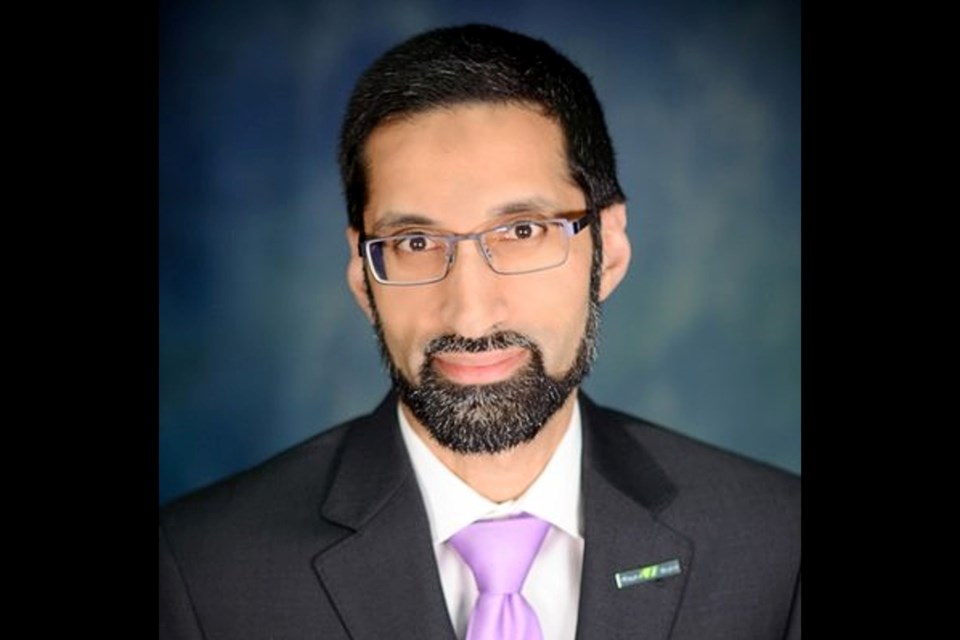The opioid crisis and the pandemic-caused gap in childhood vaccination are top-of-mind issues for the region’s incoming medical officer of health.
Public Health Sudbury & Districts announced Dec. 13 that Dr. Mustafa Hirji was selected to take over from Dr. Penny Sutcliffe as the new top doctor in the area. He is slated to become the new MOH in March, 2024, following Sutcliffe’s retirement after more than 20 years in the role.
Hirji is the former associate medical officer of health for Niagara Region Public Health.
He sat down with Sudbury.com earlier this week to discuss his new role and some of the priorities he has coming into the job. In particular, Hirji said the opioid crisis and the gap in childhood vaccinations caused by the pandemic were at the top of his list.
In terms of the opioid crisis, he said doesn't have any easy answer to solving it, but he believes there are steps that could be taken, such as providing a safe supply of drugs and decriminalizing certain drugs, that could lead to better medical treatments for the people who are addicted.
Hirji said there are several public health issues needing attention right now such as treating mental health, treating respiratory viruses and keeping childhood vaccines up to date.
"I think one of the big things that we're all focused on right now is the opioids crisis, and the large number of deaths that we're seeing from that," Hirji said.
He said he was not able to solve the problem with a quick and easy answer.
"Unfortunately, I think nobody's actually figured out the solution. This is worldwide. This is an issue we're struggling with worldwide. And I think if, the solutions were known, we would probably be implementing those solutions," Hirji said.
There are some ideas he said that could be helpful towards getting medical treatment for people with addictions.
"I think other things that we're really seeing and having some success elsewhere is safe supply," Hirji said.
"Where people who are suffering from opioid addictions, we engage them, we give them a safe supply of substances to use while engaging them, and transitioning them into treatment," he said.
He said the illicit drug trade includes all sorts of unregulated substances that are laced with poisons that can kill people.
"And there's been pretty good scientific evidence showing that when you have these safe supply programs, you do reduce the number of people passing away from opioid overdoses, which I think is our first goal.
Another issue of concern said Hirji is the criminal aspect tied to illicit drugs.
It is "something we should be looking at carefully," Hirji said.
He said people with addictions who are in possession of illegal substances are not inclined to put themselves in front of the police or the courts and face possible jail sentences.
Hirji said it scares people away from stepping forward to get treatment.
He said decriminalization would be a starting point "to hopefully have more opportunity for people to come forward with their troubles with opioids and hopefully engage them and get them into help."
He said the goal is to stop people from dying.
Hirji said that he will also be pushing to step up childhood vaccinations, since the urgency for those fell off during the pandemic.
"You know, when schools were closed during the emergency phase of the pandemic, we weren't able to vaccinate students," Hirji said."
"And a lot of students have fallen behind in their vaccines and we're seeing measles popping up recently in Toronto, I believe. We see meningococcal infections pop up. We've seen polio pop up, not so much in Canada, but in New York, in Israel, and in London, UK.," Hirji said.
"And I want to make sure we get those childhood vaccines back up to spec because I think that when you get kids vaccinated, they are pretty much protected from those illnesses. It's a small effort with a huge payout."
He added he was pleased to be named for the MOH position in Sudbury.
"I would say, I'm incredibly humbled that I've been given this opportunity. I'm following on Penny Sutcliffe, who's been here for 23 years, and is really seen as one of the best medical officers of health in the province," he said..
Hirji is scheduled to resume the new role at PHSD on March 18, 2024. As he is paid from the public purse, Sudbury.com requested details of his employment contract from the health unit but our request was denied.
Previously, Hirji was employed as the Commissioner of Public Health for the Regional Municipality of Niagara.
According to the Ontario Sunshine List, Hirji was paid the following annual salaries in the past five years:
- 2022: $461,351.08.
- 2021: $457,013.15.
- 2020: $296,583.32.
- 2019: $252,907.04.
- 2018: $246,622.51.
Len Gillis covers health care and mining for Sudbury.com.
